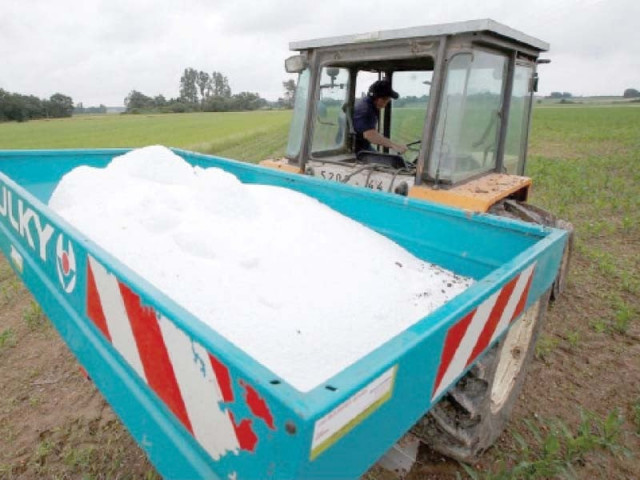Fertiliser shortage imperils world food supply
Sanctions on Russia have disrupted shipments of key inputs around globe

Sky-high fertiliser prices have farmers worldwide scaling back its use and reducing the amount of land they’re planting, fallout from the Ukraine-Russia conflict that has some agricultural industry veterans warning of food shortages.
Western sanctions on Russia, a major exporter of potash, ammonia, urea and other soil nutrients, have disrupted shipments of those key inputs around the globe. Fertiliser is key to keeping corn, soy, rice and wheat yields high. Growers are scrambling to adjust.
The pivot can be seen in agricultural powerhouse Brazil, where some farmers are applying less fertiliser to their corn, and some federal legislators are pushing to open protected indigenous lands for the mining of potash. In Zimbabwe and Kenya, small farmers are reverting to using manure to nourish their crops. In Canada, one canola farmer has already stockpiled fertiliser for the 2023 season in anticipation of even higher prices ahead.
Farmers elsewhere are making similar moves. Reuters spoke with 34 people on six continents, including grain producers, agriculture analysts, traders and farm groups. All expressed concern about the cost and availability of fertiliser.
In the United States alone, fertiliser bills are expected to jump 12% this year, after rising 17% in 2021, according to American Farm Bureau Federation and US Department of Agriculture (USDA) data.
Some growers are contemplating switching to crops that require fewer nutrients. Others plan to cultivate less acreage. Others say they’ll simply use less fertiliser, a strategy crop experts predict will hurt yields. Production is most at risk in developing nations, whose farmers have fewer financial resources to weather the storm, said Tony Will, chief executive of Illinois-based CF Industries Holdings, a leading producer of nitrogen fertiliser.
“My concern at the moment is actually one of a food crisis on a global basis,” Will told Reuters.
On Saturday, Peru declared a state of emergency in its agriculture sector over fears of food insecurity.
The decree said the nation’s planted areas have fallen 0.2% since August due to rising fertiliser prices, and that the volume of grain Peru imports for animal feed has likewise declined over cost concerns. The government is now drafting a plan to increase the country’s food supply.
Double whammy
Global fertiliser prices were already high prior to Russia’s February 24 invasion of its neighbor, as record natural gas and coal prices forced some fertiliser makers to cut output in that energy-hungry sector. Ukraine’s cities have been besieged by missiles, tanks and troops in what Moscow has dubbed a “special operation” to demilitarize the country. Russia denies targeting civilians in the conflict.
Western nations responded with tough economic sanctions on Russia, while the United States and the European Union imposed new sanctions on Belarusian President Alexander Lukashenko, who has provided support for Russia’s offensive.
Combined, Russia and Belarus accounted for more than 40% of global exports of potash last year, one of three critical nutrients used to boost crop yields, Dutch lender Rabobank said this month. Additionally, Russia accounted for about 22% of global exports of ammonia, 14% of the world’s urea exports and about 14% of monoammonium phosphate (MAP) - all key kinds of fertilisers.
Sanctions have disrupted sales of fertiliser and crops from Russia. Many Western banks and traders are steering clear of Russian supplies for fear of running afoul of the rapidly changing rules, while shipping firms are avoiding the Black Sea region due to safety concerns.
It all amounts to a double whammy for the global food supply.
Russia and Ukraine are major grain producers. Together they account for about 30% of global wheat exports and 20% of corn exports. Grain shipments through the Black Sea have already been disrupted. Stalled deliveries from those two countries have helped spur galloping global food inflation. The World Bank said last week that a number of developing countries face near-term wheat supply shortages due to their high dependence on Ukrainian exports.
But the fertiliser crisis is in some respects more worrying because it could inhibit food production in the rest of the world that could help take up the slack, said Maximo Torero, chief economist for the U.N. Food and Agriculture Organization.
“If we do not resolve the problem of fertiliser, and trade of fertilisers does not continue, then we will have a very serious problem of [food] supply next year,” Torero told Reuters.
Published in The Express Tribune, March 24th, 2022.
Like Business on Facebook, follow @TribuneBiz on Twitter to stay informed and join in the conversation.


1733130350-0/Untitled-design-(76)1733130350-0-208x130.webp)
















COMMENTS
Comments are moderated and generally will be posted if they are on-topic and not abusive.
For more information, please see our Comments FAQ